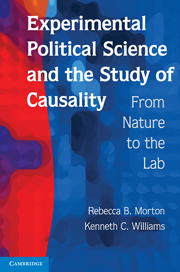14 - The Future of Experimental Political Science
Published online by Cambridge University Press: 05 June 2012
Summary
The Promise of Collaboration
In May 2009, a group of experimental political scientists from all three heritages – political psychology, political economics, and statistics – met at Northwestern University. The meeting will soon lead to a new Handbook of Experimental Political Science with essays by the various attendees. We see this handbook as an important companion to our book. This meeting, like two previous ones at New York University (NYU) in February 2008 and February 2009 (the first two meetings of the now Annual NYU Center of Experimental Social Sciences Experimental Political Science Conference), are the first conferences of which we are aware (our collective memories reach back over 20 years) in which such a broad range of experimentalists in political science have interacted. Typically experimentalists in political science have interacted mainly with those in their respective subfields within the experimental community or with non–political scientists who take similar focuses.
We believe the movement of more interaction between experimentalists in political science across heritages has the potential of adding significantly to our knowledge of political behavior and institutions. The possible collaborations are many. Consider the experimental literature on voting, one of the most studied aspects of political behavior. Although the purpose of this book is not a substantive review of experimental literature on particular topics, we have presented a number of examples of experiments on voting to illustrate various methodological issues.
- Type
- Chapter
- Information
- Experimental Political Science and the Study of CausalityFrom Nature to the Lab, pp. 525 - 529Publisher: Cambridge University PressPrint publication year: 2010



